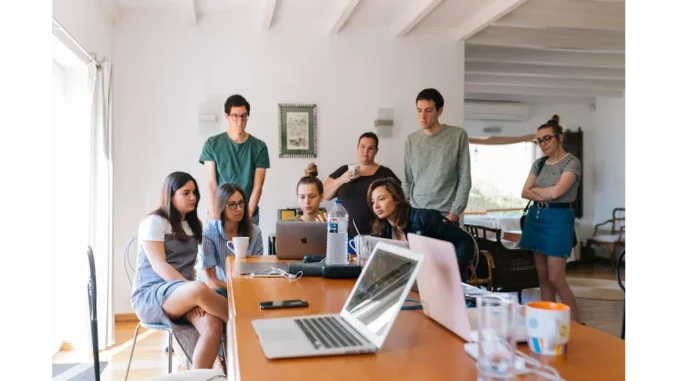
Summary
Tech Startups Catalyse Internet Evolution with Web 3.0, Metaverse, and AI Innovations
The digital landscape is on the brink of a transformative shift, driven by tech startups pioneering advancements in Web 3.0, the metaverse, and artificial intelligence. As the internet transitions from a mobile-first, social media-driven platform to a more decentralised and immersive experience, these technologies promise to redefine user interactions and digital economies. “We are witnessing the dawn of a new digital era, where control and creativity are shifting back to the user,” says Martin Kepler, CEO of innovative AI firm NeuralNet. As these technologies continue to mature, they are poised to reshape our online experiences, presenting both opportunities and challenges that will demand attention from developers, users, and regulators alike.
Main Article
The internet, once a static space for email and basic browsing, is undergoing a dramatic evolution. Today’s digital realm is characterised by its mobile-first approach, global connectivity via social media, cloud-based infrastructure, and AI-driven user experiences. Yet, the horizon holds even more significant changes, spearheaded by innovative tech startups eager to redefine the very fabric of the digital world.
Web 3.0: Reclaiming User Autonomy
One of the most transformative developments is the advent of Web 3.0, often referred to as the “decentralised web.” This evolution aims to shift power from large tech corporations to individual users, leveraging blockchain technology to ensure transparency and security. Users can now own and control their data through token-based economics, leading to the creation of decentralised social networks, storage, and financial systems. “Web 3.0 represents a paradigm shift towards a more democratic internet,” remarks Lena Foster, co-founder of a leading blockchain startup.
The Metaverse: Expanding Digital Frontiers
Equally groundbreaking is the concept of the metaverse, a fully immersive digital universe where the boundaries between virtual and physical realities blur. Startups are at the forefront of developing virtual reality workspaces, augmented reality shopping experiences, and digital real estate markets. These innovations promise new ways to work, play, and socialise. While the concept may seem futuristic, experts believe the metaverse will become an integral part of our digital ecosystem.
AI and Machine Learning: Personalising the Internet
AI and machine learning technologies are continuously transforming how we interact with the internet. Startups are harnessing these tools to create more personalised user experiences. From tailored content recommendations and advanced chatbots to predictive analytics and AI-powered cybersecurity, the applications are vast. The financial sector, for instance, is witnessing the rise of AI trading bots like Immediate AI, which can rapidly analyse market trends and execute trades with unprecedented speed.
The Internet of Things: Connecting the Unconnected
The Internet of Things (IoT) is linking everyday objects to the internet, creating a network of smart devices that streamline daily tasks. Innovations in smart home devices, wearable technology, and industrial IoT are leading us towards a more integrated and automated world. These advancements suggest a future where digital and physical realms are seamlessly intertwined.
Detailed Analysis
The progression of these technologies signifies not only a technical evolution but also a potential shift in economic and social structures. The decentralisation of Web 3.0 could democratise access to digital resources, reducing reliance on major tech firms. This shift encourages a more equitable distribution of digital assets and data ownership.
The metaverse introduces new economic opportunities, heralding the rise of virtual economies and digital real estate. As digital spaces become more immersive, they create new avenues for commerce, education, and entertainment, reshaping traditional industries.
AI’s increasing role in personalisation and automation could enhance user engagement and business efficiencies. However, the ethical implications of AI—such as bias in algorithms and the need for ethical oversight—remain critical challenges that need addressing.
The IoT’s expansion suggests a trend towards greater automation and connectivity, posing questions about data privacy and the environmental impact of an ever-growing network of connected devices.
Further Development
As these technologies continue to evolve, several key areas will require ongoing attention. Privacy and security remain paramount, with startups needing to implement robust security measures and transparent privacy policies to protect user data.
The digital divide poses another significant challenge. Ensuring equitable access to high-speed internet and advanced devices is crucial to prevent further disparities between different demographics and regions.
Environmental sustainability is a growing concern, with emphasis needed on reducing the energy consumption of data centres and blockchain networks. Startups and tech giants alike must work towards greener solutions.
The future of the internet, driven by these innovative technologies, holds immense potential. Readers are encouraged to stay informed as these developments unfold, promising a digital landscape that is more personalised, immersive, and democratised.

